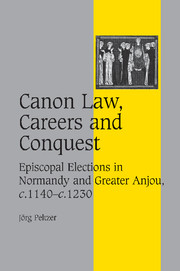Book contents
- Frontmatter
- Contents
- List of maps
- List of tables
- Preface
- Editorial note
- List of abbreviations
- 1 INTRODUCTION
- 2 ELECTORAL THEORY
- 3 ELECTORAL PRACTICE: NORMANDY
- 4 ELECTORAL PRACTICE: GREATER ANJOU
- 5 THE EPISCOPACY IN NORMANDY AND GREATER ANJOU
- 6 THE IMPACT OF THE CAPETIAN CONQUEST OF 1204/6
- 7 CONCLUSION
- APPENDICES
- Bibliography
- Index
- Cambridge Studies in Medieval Life and Thought Fourth Series
1 - INTRODUCTION
Published online by Cambridge University Press: 09 August 2009
- Frontmatter
- Contents
- List of maps
- List of tables
- Preface
- Editorial note
- List of abbreviations
- 1 INTRODUCTION
- 2 ELECTORAL THEORY
- 3 ELECTORAL PRACTICE: NORMANDY
- 4 ELECTORAL PRACTICE: GREATER ANJOU
- 5 THE EPISCOPACY IN NORMANDY AND GREATER ANJOU
- 6 THE IMPACT OF THE CAPETIAN CONQUEST OF 1204/6
- 7 CONCLUSION
- APPENDICES
- Bibliography
- Index
- Cambridge Studies in Medieval Life and Thought Fourth Series
Summary
THEMATIC INTRODUCTION
The bishop occupied a central place in medieval society. He was the spiritual leader of the people and the clergy and exercised the supreme jurisdictional authority over ecclesiastical matters in his diocese. The bishop was also a secular lord. His significance varied according to the extent and wealth of his temporal possessions, but he could count among the most powerful political players in the region, possibly exercising influence well beyond his diocesan borders. Thus combining spiritual and secular powers the bishop was a focal point for the flock, the local ecclesiastics and the pope, the aristocracy and the ruler; his election was of great interest to many people.
A considerable number of studies have been devoted to the episcopal election. They have analysed its ‘political’ side, that is the nature and extent of the influence of different groups interested in its outcome, and they have examined its ‘normative’ side, that is the development of the regulations for electoral procedure aimed at guaranteeing the selection of a suitable candidate. In a recent survey Franz-Reiner Erkens has emphasised the significance of the period from the late eleventh to the mid-thirteenth century in the development of episcopal elections. In this period, the framework in which elections took place changed. Until the late eleventh century the papacy played only a minor role; elections were decided on the local level, that is between the ruler, the local aristocracy, and the local clergy. Local custom set the norms for the procedure.
- Type
- Chapter
- Information
- Canon Law, Careers and ConquestEpiscopal Elections in Normandy and Greater Anjou, c.1140–c.1230, pp. 1 - 19Publisher: Cambridge University PressPrint publication year: 2007



